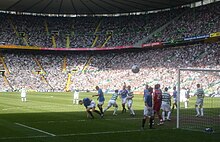Old Firm

The Old Firm is the name given to the relationship between two football teams in Scotland, Rangers F.C. and Celtic F.C.
Head to head record[change | change source]
| Competition | Played | Rangers | Draw | Celtic |
|---|---|---|---|---|
| Scottish League | 288 | 112 | 82 | 94 |
| Scottish Cup | 46 | 16 | 8 | 22 |
| League Cup | 45 | 23 | 2 | 20 |
| Totals | 379 | 151 | 92 | 136 |
1888-1999 statistics obtained from RSSSF. Remaining stats obtained from Soccerbase Archived 2007-10-01 at the Wayback Machine
History[change | change source]

The Old Firm have a lot of history, possibly dating back to around 1888, Celtic's first match, which was against Rangers, when a newspaper report stated that both sets of players "got on so well that you would believe that they were old firm friends." However, William J. Murray states that the term comes from the commercial benefits of the two clubs' rivalry, which were viewed with distaste in some parts in the early days of the game [1]
The two clubs are the most successful in Scotland, having won between them 63 Scottish Cups and 93 Scottish Premier League championships (as of 2007).[2] The two clubs normally compete four times a year in the SPL and are regularly drawn against each other in the two Scottish cup competitions.
The clubs' have large support bases around Glasgow, but also have supporters clubs in most towns throughout Scotland and in many cities around the world. The presence of Rangers and Celtic has been estimated to be worth £120 million to the Scottish economy.[3]
The two clubs' fan bases have historically been divided on religious lines. Celtic are supported by Catholics, while Rangers are supported by Protestants.
Players[change | change source]
There have been many high profile players to play for both sides of the Old Firm. The most recent players to do so are Kenny Miller, Maurice Johnston, Steven Pressley, Mark Brown and Barry Robson. Kenny Miller is the first player in the modern era to cross the Old Firm divide twice, having played for Rangers then Celtic, then moving back to Rangers.[4]
References[change | change source]
- ↑ Murray, William J. (1984). The Old Firm: sectarianism, sport, and society in Scotland. Edinburgh: J. Donald Publishers; Atlantic Highlands, N.J.. ISBN 0-85976-121-5.
- ↑ "Old Firm". Rangers official website. Archived from the original on 2009-07-22. Retrieved 2006-09-05.
- ↑ "Old Firm on the ball for economy". BBC News Online. 29 June 2005. Retrieved 2005-06-29.
- ↑ "Miller delight at Rangers return". BBC News. 13 June 2008. Retrieved 2009-01-07.
